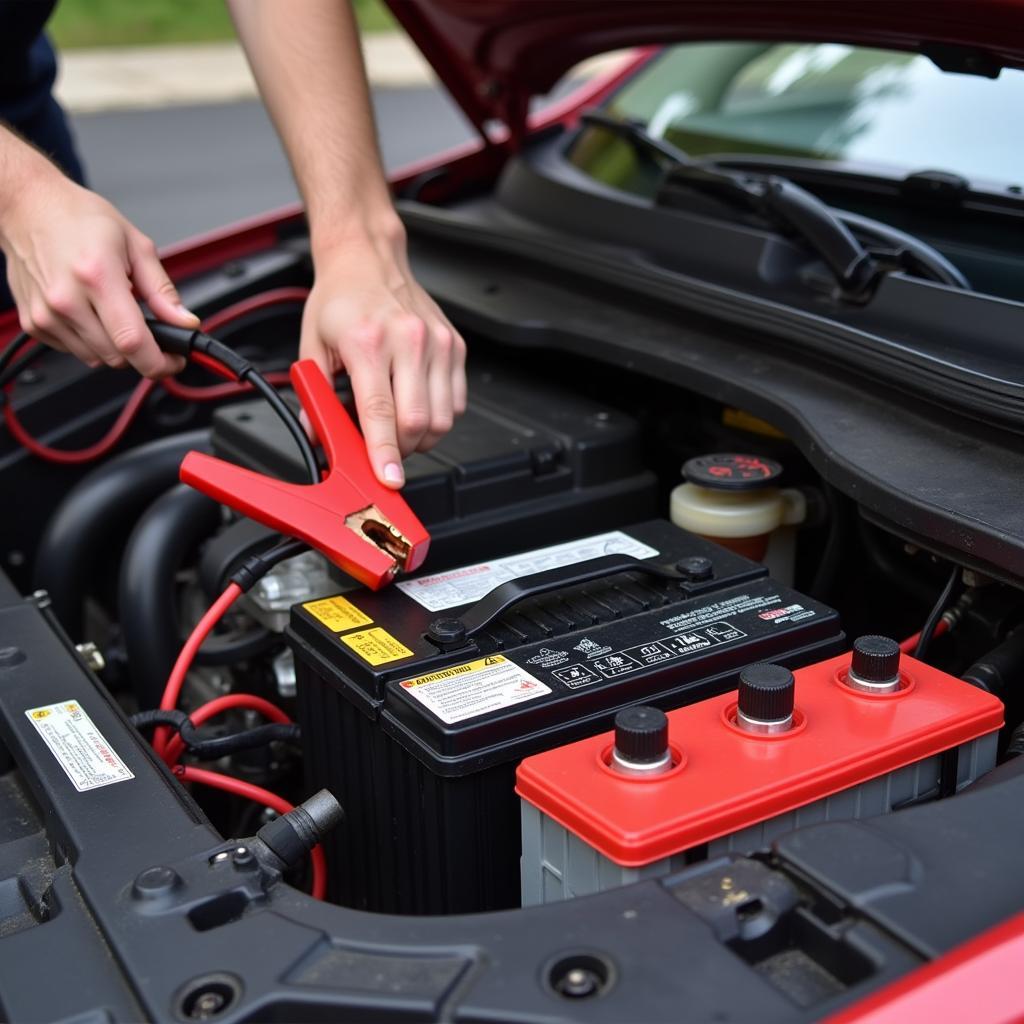A dead car battery is a frustrating experience. Understanding car battery discharge causes is crucial for preventing this common problem. This article explores the various reasons why your car battery might be losing its charge, offering solutions and preventative measures.
 Jump starting a dead car battery.
Jump starting a dead car battery.
Common Car Battery Discharge Causes
Several factors can contribute to a discharged car battery. These range from simple oversights to more complex electrical issues. Here are some of the most frequent culprits:
- Leaving lights on: This is perhaps the most common reason. Interior lights, headlights, or even parking lights left on can drain a battery overnight.
- Extreme temperatures: Both extreme heat and cold can affect a battery’s performance and lifespan. Heat can accelerate the chemical reactions within the battery, leading to faster discharge. Cold can thicken the battery’s internal fluids, making it harder to generate power.
- Old age: Car batteries have a limited lifespan, typically 3-5 years. As they age, their ability to hold a charge diminishes.
- Short trips: Short trips don’t give the alternator enough time to fully recharge the battery after starting the engine. This can lead to a gradual discharge over time.
Parasitic Drain: The Silent Battery Killer
A parasitic drain occurs when an electrical component continues to draw power even when the car is off. This can be caused by faulty wiring, malfunctioning relays, or even aftermarket accessories like compact bluetooth car radio. Identifying and fixing a parasitic drain is essential to prevent recurring battery discharge.
- How to detect a parasitic drain: A simple test involves disconnecting the negative battery cable and placing a multimeter between the cable and the battery terminal. A reading higher than 50 milliamps usually indicates a parasitic drain.
“Parasitic drains can be tricky to diagnose,” says automotive electrical expert, David Miller. “A systematic approach, starting with checking the most common culprits, is crucial for pinpointing the source of the drain.”
Faulty Alternator: Not Charging Properly
The alternator is responsible for recharging the battery while the engine is running. A failing alternator won’t recharge the battery effectively, leading to a gradual discharge and eventual failure. Common signs of a bad alternator include dimming headlights, flickering dashboard lights, and a whining noise from the engine bay.
How to Test Your Alternator
You can test your alternator using a multimeter. With the engine running, measure the voltage across the battery terminals. A healthy alternator should produce a voltage between 13.5 and 14.5 volts.
Preventing Car Battery Discharge
Proactive maintenance can significantly extend your battery’s life and prevent unexpected discharges. Here are some preventive measures:
- Regularly clean battery terminals to remove corrosion.
- Turn off all lights and accessories before exiting your vehicle.
- Limit short trips or consider using a trickle charger to maintain the battery’s charge.
- Have your battery tested annually, especially if it’s more than three years old.
- If you frequently experience warning brake proportioning porsche cayenne, it is advisable to have your car’s electrical system checked thoroughly.
- Consider upgrading your car stereo with bluetooth and hd radio for 2003 envoy with a power-saving mode.
“Preventive maintenance is key to a healthy car battery,” adds Miller. “Regular checks and simple precautions can save you from the hassle of a dead battery.” Addressing car battery discharge causes proactively will ensure reliable starts and a longer battery lifespan.
Conclusion
Understanding car battery discharge causes is essential for every car owner. By addressing these issues promptly and adopting preventive measures, you can avoid the inconvenience and frustration of a dead battery. Regularly inspecting your battery, especially during temperature extremes, and understanding the signs of a failing alternator are crucial for maintaining a healthy and reliable electrical system. Remember to turn off all lights and accessories, limit short trips, and if you’re looking to enjoy your favorite tunes wirelessly, ensure your bluetooth iphone music to car radio connection is optimized for power efficiency. If you’re struggling with outdated car audio and looking for alternative solutions, explore options like an fm transmitter app for phone to car radio without bluetooth.
FAQ
-
How long does a car battery last? Typically 3-5 years.
-
Can a car battery discharge while driving? Yes, if the alternator is faulty.
-
What are the signs of a dying car battery? Slow engine cranking, dimming lights, and clicking sounds when turning the key.
-
How can I test my car battery? Use a multimeter to check the voltage.
-
What should I do if my car battery is completely dead? Jump-start it using jumper cables or call for roadside assistance.
-
How can I prevent my car battery from discharging? Turn off all lights and accessories, limit short trips, and clean battery terminals regularly.
-
What is a parasitic drain? An electrical component that continues to draw power even when the car is off.
